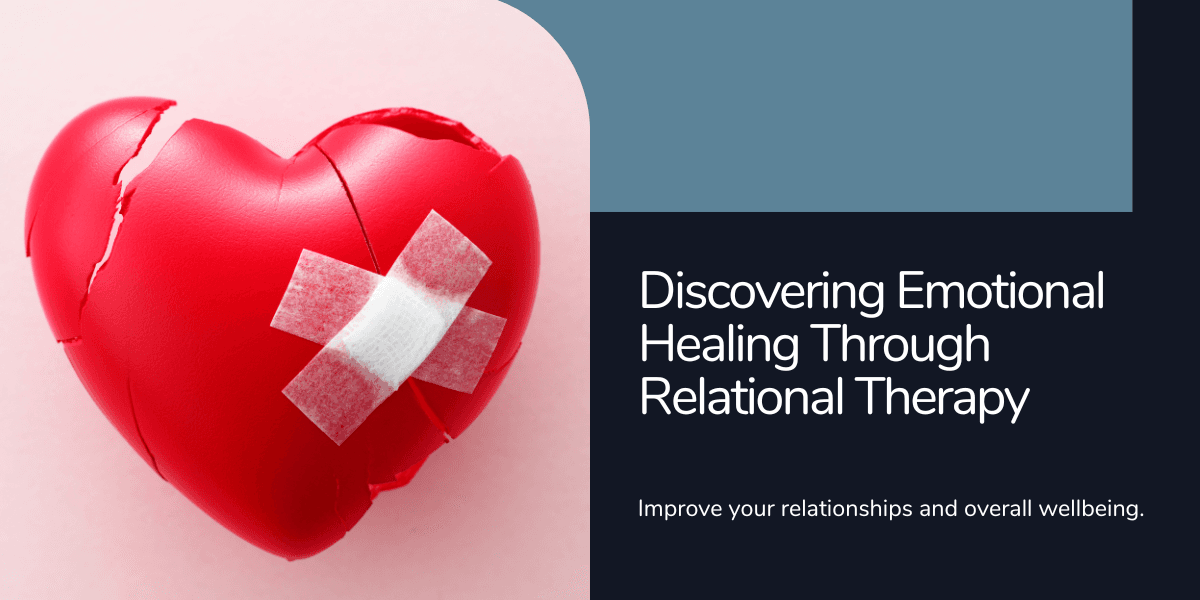Discovering Emotional Healing Through Relational Therapy

Introduction
Relational therapy is a form of therapy that focuses on the relationships between individuals and their social, cultural, and family backgrounds. It is a type of psychotherapy that explores the impact of relationships on one’s emotional, psychological, and physical well-being. This therapy is based on the premise that our relationships shape who we are and how we experience life, and that working through our relationships can lead to growth, healing, and increased happiness.
What is Relational Therapy?
Relational therapy is a holistic approach to therapy that addresses a person’s relationships in all areas of their life. This can include intimate partnerships, family relationships, friendships, work relationships, and relationships with one’s community and culture. The focus of relational therapy is on the individual’s patterns of interaction, emotional needs, and communication styles within their relationships.
Social Factors and Identities
Relational therapy recognizes that individuals have unique experiences and identities that shape their relationships. This includes factors such as culture, race, gender, sexual orientation, religion, and socioeconomic status. A relational therapist will help clients understand how these identities intersect with their relationships and how they impact their emotional experiences.
A Process of Healing
Relational therapy is a process of healing that helps individuals understand their patterns of behavior in relationships and how these patterns can be changed to improve their relationships. The therapist will help the client explore their emotional experiences, thoughts, and feelings related to their relationships. Through this exploration, the client will gain insight into their behavior and the ways in which they can improve their relationships.
Feeling Seen
Relational therapy is designed to help individuals feel seen, heard, and understood in a supportive and non-judgmental environment. The therapist will provide a safe space for clients to express their feelings and experiences related to their relationships. Through this process, the client will feel empowered to make changes in their relationships and will learn to trust themselves and their instincts.
The Intersection of Self to Others
Relational therapy explores the ways in which individuals interact with others and how their relationships impact their emotional experiences. The therapist will help the client understand their patterns of behavior and how they can make changes to improve their relationships. This includes exploring the client’s emotional needs, communication styles, and the impact of past experiences on their current relationships.

The Path of Exploration
Relational therapy is a path of exploration that helps individuals understand their experiences and relationships. The therapist will help the client explore their thoughts, feelings, and behavior related to their relationships. Through this exploration, the client will gain insight into their patterns of behavior and the ways in which they can improve their relationships.
Repairing, Building, and Maintaining Healthy Relationships
Relational therapy is designed to help individuals repair, build, and maintain healthy relationships. The therapist will help the client understand their patterns of behavior and the impact they have on their relationships. The therapist will also provide strategies for improving communication, emotional intimacy, and building trust in relationships.
How to Know if Your Relational Therapist is the Right Therapist
Finding the right therapist is important for a successful therapy experience. A good relational therapist should be empathetic, and non-judgmental, and provide a safe and supportive environment for their clients. It is also important to find a therapist who has experience working with the type of relationships you want to address in therapy.
Moments of Discomfort
Relational therapy can be uncomfortable at times, as it requires individuals to examine their relationships and behavior. However, this discomfort is a necessary part of the healing process and can lead to growth and improved relationships. A good relational therapist will provide
support and guidance during these moments and will help the client navigate through their discomfort.
Sharing Your Hidden Parts
Relational therapy requires individuals to be vulnerable and open about their experiences and emotions related to their relationships. The therapist will provide a safe and supportive environment for clients to share their hidden parts and explore the ways in which these parts impact their relationships. Through this process, clients will gain a deeper understanding of themselves and their relationships.
Finding the Right Fit
It is important to find a relational therapist who is a good fit for you. This means finding a therapist who is empathetic, non-judgmental, and who provides a safe and supportive environment. It is also important to find a therapist who has experience working with the type of relationships you want to address in therapy. It may take some time to find the right therapist, but it is worth it for a successful therapy experience.
Careme Health and Our Offerings
Careme Health is a digital platform for mental health and wellness that offers relational therapy and other forms of therapy to individuals seeking support and healing. Our therapists are licensed and experienced in providing a safe and supportive environment for clients to explore their relationships and emotions. We offer a variety of therapy options, including individual therapy, couples therapy, and family therapy, to meet the unique needs of our clients. Our mission is to provide access to high-quality mental health care and support to individuals in their journey toward emotional healing and stronger relationships.
Conclusion
Relational therapy is a powerful form of therapy that can help individuals understand and improve their relationships. It is a process of healing and growth that requires individuals to be vulnerable and open about their experiences and emotions. Careme Health provides access to experienced and licensed therapists who can support individuals in their journey towards emotional healing and stronger relationships.
Related Articles

Letting Go With Grace: Emotional Tools for Closure
Letting go is never easy. Whether we are parting ways with a loved one, ending a relationship, leaving a job, or saying goodbye to a cherished chapter of life, the emotional weight can feel overwhelming. Yet, closure is essential for our emotional well-being. Without it, we carry unresolved grief, anger, regret, or longing that can seep into new relationships and experiences, holding us back from healing and growth.

Breakup Blues: How to Cope and Rebuild Your Self-Worth
A breakup often feels like a silent earthquake—unseen by others but devastating within. The pain doesn’t just come from the loss of a relationship, but from the crumbling of the life, identity, and future you built with another person. You may find yourself questioning your worth, doubting your value, and feeling isolated even when surrounded by people. In Indian society, where emotional expression is often discouraged and breakups can be stigmatized, this pain may feel even more overwhelming. But the truth is—while breakups may shake you, they do not define you. You are not broken; you are in a process of emotional reformation. And with the right tools, guidance, and support system, you can rebuild not just your self-worth but also your entire life narrative.

Healing After Heartbreak: A Mental Health Perspective
Heartbreak doesn't just break your heart—it can shatter your sense of identity, peace, and purpose. Whether the end was expected or abrupt, mutual or one-sided, short-lived or long-term, the aftermath often leaves people emotionally disoriented. In Indian culture, where societal expectations and family involvement in romantic relationships are prevalent, the pain is not just personal—it is public. Yet, very few are taught how to heal from emotional loss in a healthy, sustainable way.

Boundaries in Love: Saying ‘No’ Without Guilt
Love, in its truest form, should be a safe space—a space where individuality is not only respected but celebrated. Yet, in many relationships, especially in the Indian cultural context, love is often misunderstood as constant availability, complete sacrifice, and putting the other person first, always. As noble as this may sound, this version of love often leads to emotional exhaustion, suppressed resentment, and the erosion of one’s identity.

Gaslighting in Relationships: What It Is and How to Heal
Gaslighting is a form of emotional abuse that erodes your ability to trust your own perception. It’s a slow, insidious process that often begins with subtle doubts and ends with complete self-questioning. In romantic relationships—especially in the Indian context where silence, compromise, and duty are often mistaken for love—gaslighting can be even harder to recognize.

How Depression Can Affect Your Relationship—And What You Can Do
Depression is not just an internal struggle—it ripples outward, affecting relationships, routines, and the emotional fabric that holds people together. When someone is dealing with depression, it's not only their world that becomes dim—it can cast a shadow over their most intimate connections too. In a country like India, where open conversations about mental health are still rare and love is often equated with endurance, depression within a relationship can become invisible, misunderstood, or misjudged.
